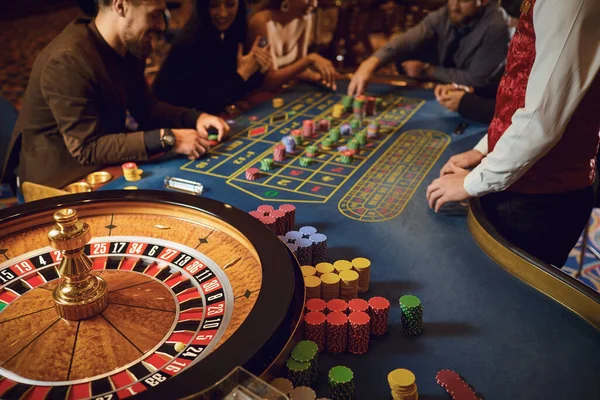Gambling can be an exhilarating experience, filled with the thrill of potential wins and the excitement of chance. However, it is crucial for players to recognize when it's time to call it quits. Understanding your odds and acknowledging emotional triggers can be the key to responsible gambling. This article provides insights into how you can effectively assess when to walk away from a casino game.
Assessing Your Odds: When the House Always Wins
One of the most vital aspects of gambling is understanding the odds and recognizing the inherent advantage that casinos hold over players. This understanding can influence your decision-making and help you determine whether it's time to walk away.
Understanding the House Edge
The house edge is the statistical advantage that a casino has over the players. Every game has a different house edge, which impacts your chances of winning. Here’s how you can assess the house edge for various games:
| Game | House Edge | Player Strategy |
|---|---|---|
| Blackjack | 0.5% | Use basic strategy to minimize edge |
| Roulette (European) | 2.7% | Bet on outside bets for better odds |
| Slots | 2-15% | Choose machines with higher RTP |
| Baccarat | 1.06% (Banker Bet) | Bet on Banker for optimal odds |
Practical Tips for Assessing Your Odds
- Know the Rules: Familiarize yourself with the rules of the game and how the odds work. This knowledge equips you to make informed decisions.
- Set a Budget: Before you start playing, set a fixed budget and stick to it. This helps prevent overspending.
- Track Your Losses: Keep a record of your gambling sessions. If you notice consistent losses, it may be time to step back.
- Understand Variability: Recognize that some games are more volatile than others. For example, slots can be unpredictable, while table games like blackjack offer more stability.
Recognizing the Right Time to Walk Away
- Consistent Losses: If you find yourself losing repeatedly, it may be a sign that it's time to walk away.
- Hitting Your Budget Limit: If you’ve reached your predetermined budget amount, leave the game, regardless of whether you are winning or losing.
- Feeling Frustrated or Anxious: These emotions can cloud your judgment and lead to more reckless decisions.
Recognizing Emotional Triggers: Gambling vs. Entertainment
Gambling is often perceived as a form of entertainment, but it can quickly transform into a source of stress or anxiety if not managed correctly. Recognizing emotional triggers is essential to maintaining a healthy relationship with gambling.
Identifying Emotional Triggers
- Stress Relief: Many people gamble to escape stress. While it can provide temporary relief, it often exacerbates feelings of anxiety if losses occur.
- Social Pressure: The atmosphere of the casino or peer influence can create a sense of obligation to continue playing even if it’s not enjoyable.
- Chasing Losses: A common pitfall is the urge to win back losses. This often leads to further losses and heightened emotions.
Practical Tips for Managing Emotional Triggers
- Set Time Limits: Limit the amount of time you spend in the casino. This can help curb emotional decisions driven by the thrill of being in the game.
- Find Alternative Activities: Engage in other forms of entertainment that don’t involve gambling. This can help you discern between genuine enjoyment and compulsion.
- Practice Mindfulness: Stay aware of your emotional state. If you start feeling stressed or pressured, it might be time to step away.
- Seek Help: If you find that emotional triggers are impacting your gambling habits, consider speaking to a professional or joining a support group.
When Casino Engagement Becomes a Problem
- Persistent Gambling Despite Losses: If you continue to gamble even when you’re losing and feeling stressed, it's crucial to assess the situation critically.
- Neglecting Responsibilities: If gambling starts taking priority over work, relationships, or personal health, it’s a clear indicator that a break is necessary.
In conclusion, gambling should be approached with caution and responsibility. Knowing when to walk away is an essential skill that every player should cultivate, ensuring that they enjoy their time in the casino without jeopardizing their financial stability or emotional well-being. By understanding your odds and recognizing emotional triggers, you can make informed decisions. Remember, SECTIONS of self-awareness and strict budgeting can help you navigate the thrilling yet unpredictable landscape of gambling.
Answer Block for Questions 5-7
5. How do I know if I should stop playing?
If you're experiencing consistent losses, feel emotionally drained, or have reached your budget limit, it's a clear sign to stop playing. Trust your instincts and take a break.
6. What should I do if I want to continue enjoying gambling responsibly?
Set clear limits for both time and money, engage with games that have better odds, and remember to prioritize fun over winning. Consider gambling as entertainment rather than a source of income.
7. How can I manage my emotions while gambling?
Be mindful of your emotional state during play. If you start feeling frustrated or anxious, take a break. Practice mindfulness techniques and consider alternative forms of entertainment if you find yourself relying heavily on gambling for enjoyment.
